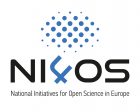We first heard of coronavirus (Covid-19) around last november, when some people who visited a seafood market in Wuhan reported having pneumonia-like symptoms. Since then the scientific community haven’t stopped for a second looking for a cure.

An open science cloud can be a real treasure during times like this, especially one that can share scientific data and literature for an entire continent. EOSC is an important aid for Europe’s researchers right now, it provides a huge playground for them to put the puzzle pieces together and maybe in the end making it possible to find a weapon against this global epidemic.
As The Washington Post already wrote, the genome of the SARS-COV-2 virus was uploaded to an open access repository ten days after the disease was first reported. This step made it possible for scientists to work together no matter the distance keeping them apart.
Other platforms follow the good example

The current situation boosts the use of pre-print servers due to the lack of time we have. Since there is no time for waiting journals to get articles through the peer-review process, authors expect their colleagues in the world to do it. Pre-print servers such as bioRxiv are full with manuscripts on Covid-19 (638 article at the moment) and researchers around the world are very responsive to them. It is beautiful to see how they sacrifice their free time to comment on each other’s paper, considering there is no financial reward doing so.
Gisaid and Nextstrain are also valuable assets combating the virus. Nextstrain is an open source application that tracks the evolution of viruses and bacteria, and Gisaid is a platform for sharing genomic data.
There are different problem areas that have been defined within the academic ecosystem such as cultural diversity, interoperability and user engagement issues with different infrastructures, fundig, sustainability and assessment. The pandemic situation shows us that if there is a greater goal, collaboration, interoperability, funding and assessment issues are negligible. Academics are competing but with a worldwide collaboration and for a global good to find the treatment for COVID-19 and to be able to create it’s vaccine.
The current situation shows us that sharing knowledge is key. The world just started acting in union and using open science tools as if it were natural.
